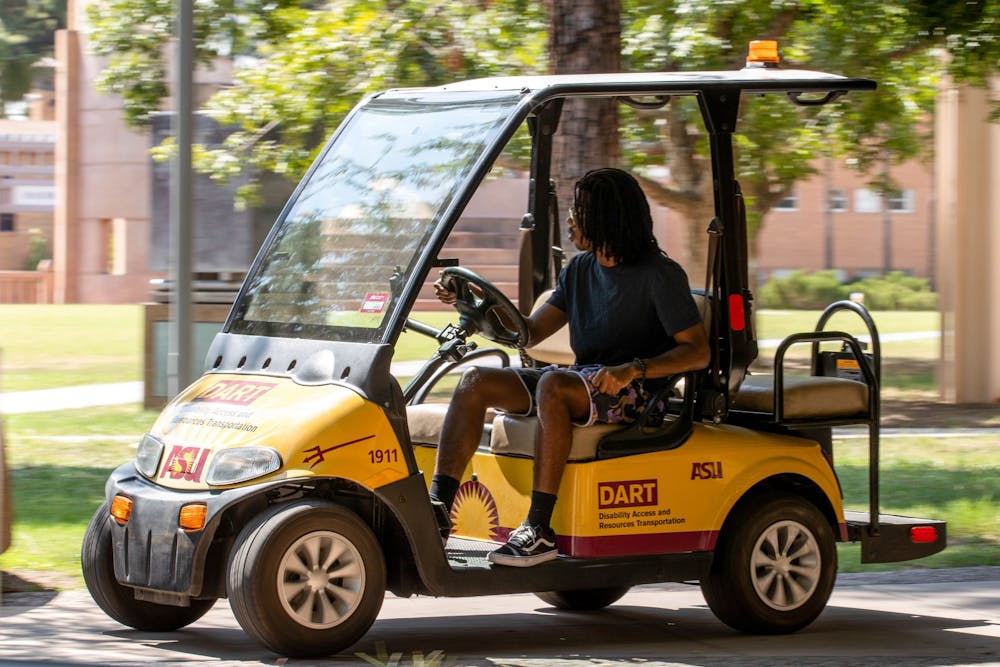A report released by the Federal Transit Administration in late August following a study conducted by ASU indicates increased levels of safety, mobility and satisfaction with autonomous vehicles — or robotic taxis.
Participants in the study consisted of a self-selected group of people over 65 and paratransit-certified people under the Americans with Disabilities Act. The study, a collaboration between ASU, Valley Metro and Waymo, shows insight into the future of accessible transportation in the Phoenix Metropolitan area.
Ram Pendyala, a professor for the School of Sustainable Engineering and the Built Environment, led the ASU portion of the study, evaluating the inclusion of on-demand, autonomous taxis as a transportation option and their usefulness.
"Our role was to do all of the data collection, data analysis and surveys necessary for evaluating the efficacy of the service," Pendyala said. "If you take an AV (autonomous vehicle) based mobility-on-demand service, how do riders feel about it? How do non-riders feel about it? How well did it serve their needs?"
Long-term benefits of the research on the disability community have yet to be seen, but Pendyala said "in general, autonomous vehicle transportation is probably a very good candidate for campuses."
The study began in 2016 when Valley Metro was awarded a grant as part of the FTA's Mobility on Demand Sandbox program. Valley Metro and Waymo partnered together to begin using Waymo autonomous vehicles as part of the RideChoice program, a subsidized curb-to-curb service.
The RideChoice program currently operates in some Phoenix areas.
Benefits could be "two or threefold" compared to traditional transit methods – automated vehicle services could become both more affordable and safer by eliminating the driver, Pendyala said.
Although the service is not complete, accessibility challenges will be solved in making it ADA compliant, so riders with wheelchairs can get in and out of vehicles safely.
"Assuming that we can get that engineering and that design figured out, I think that this could be an amazing, revolutionary transformation in transportation," Pendyala said.
Disability resources on campus already include a transportation service students say works for all intents and purposes — for now.
Disability Access and Resources Transportation, an end-to-end campus transportation system for students, faculty and University guests with physical disabilities, serves ASU's four Phoenix metropolitan campuses.
"DART definitely is such a helpful service for students with permanent and temporary disabilities," Isabel Ledesma, a freshman studying art and member of the Accessibility Coalition wrote in an email. "As a student with both, it's a relief to know that I have the support I need to help me function and get around campus in a safe and efficient way."
Ledesma said while flexibility and staffing could be improved, students feel welcomed and supported by the drivers.
Natalie Snodgrass, a senior studying psychology and co-president of the Accessibility Coalition, said in an email "accessibility is so important because, no matter what race, gender, size, age, anyone could be disabled and the disability community is extremely underserved."
Snodgrass wrote about how autonomous vehicles could be a solution to properly serving the community.
"I think that it could be amazing if it would help students who need this resource," Snodgrass wrote. "A way for us to move in a direction that provides more accessibility on campus."
Reach the reporter at wstuart1@asu.edu and follow @wjstuart01 on Twitter.
Like The State Press on Facebook and follow @statepress on Twitter.
Continue supporting student journalism and donate to The State Press today.




